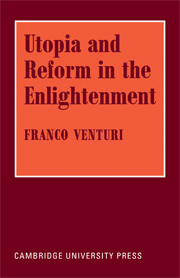IV - The right to punish
Published online by Cambridge University Press: 07 October 2011
Summary
In the autumn of 1756 a gentleman in Abruzzo wrote to his friend in Rimini. This gentleman was Romualdo Sterlich. In spite of his German name, he was a typical representative of the culture of that part of the kingdom of Naples. His friend's name, Giovanni Bianchi, was, in contrast, so ordinary that he generally used the more distinguished Latin transliteration, Janus Plancus. He was one of the most cultured of the doctors and scientists in that part of the Papal state. Sterlich told him he had come by a copy of a short French book entitled Code de la nature ou le véritable esprit des lois, and that he had read it with great curiosity. ‘It would desire the abolition of the ownership of goods, and that everything should return to the community.’ It was the book by Morelly which is so well known today. This was the first expression of eighteenth-century French communism, and, under Diderot's name, had far-reaching echoes throughout the century, until the time of Babeuf's conspiracy. We should not be surprised to find that a gentleman of Chieti in Abruzzo owned it less than a year after its publication. We find the Code de la nature in Naples, in the same period or a little later, in the hands of Antonio Genovesi and of Francescantonio Grimaldi.
- Type
- Chapter
- Information
- Utopia and Reform in the Enlightenment , pp. 95 - 116Publisher: Cambridge University PressPrint publication year: 1971
- 1
- Cited by



